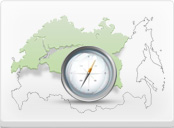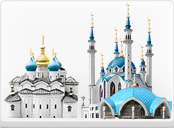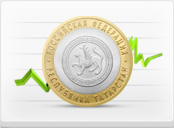History, culture, religion
Volga Bulgaria was the first state formed in the region. It was created by Turkic tribes at the turn of 9 th-10th centuries. In 922 Islam became an official religion. In 1236 Bulgaria was merged into the Empire of Genghis Khan, after that it became a part of the Golden Horde and as a result of its dissolution a new state, the Kazan Khanate, emerged in 1438 and was incorporated to Russia in 1552.
In 1920 the Tatar Autonomous Soviet Socialist Republic was declared.
The Declaration on State Sovereignty of the republic was adopted on August 30, 1990. In 1994 the Treaty between the Russian Federation and the Republic of Tatarstan on Delimitation of the Jurisditional Subjects and Mutual Delegation of Powers between the State Bodies of the Russian Federation and the State Bodies of the Republic of Tatarstan was signed. It was followed by the Treaty on Delimitation of the Jurisdictional Subjects and Powers between the State Bodies of the Russian Federation and the State Bodies of the Republic of Tatarstan in 2007.
People with various historical and cultural traditions live in the republic. The combination of at least three types of cultural interaction (Turkic, Russian-Slavic and Finno-Ugric) defines the uniqueness of this area, the originality of cultural and historical values.
Destinies of many outstanding cultural workers are intertwined with Tatarstan: singer Feodor Chaliapin, writers Leo Tolstoy, Sergey Aksakov and Maxim Gorky, Vasily Aksenov, poets Evgeny Boratinsky, Gavriil Derzhavin, Marina Tsvetaeva and Nikita Zabolotsky, artists Ivan Shishkin and Nikolay Feshin. Such classics of Tatar poetry as Gabdulla Tukay, hero and poet Musa Jalil, composers Farid Yarullin, Salih Saidashev, Nazib Zhiganov, Sofia Gubaidulina and many others made the Tatar culture famous.
The traditional religions of the Republic of Tatarstan are Islam and Orthodox Christianity. Tatars and Bashkirs (i.e. nearly half of the population of the republic) confess Islam. The others, including Russians, Chuvashes, Maris, Udmurts, Mordovians – are Orthodox Christians. Catholicism, Protestantism, Judaism and other confessions are also presented in Tatarstan.
Keeping the balance of interests between the two major religions and equality of all religions before the law lies at the heart of inter-faith consent in the republic.
-
 Educational portal of RT
Educational portal of RT
-
 Investment portal of RT
Investment portal of RT
-
 SMART City Kazan
SMART City Kazan
-
 State Television and Radio Broadcasting Company "Tatarstan"
State Television and Radio Broadcasting Company "Tatarstan"
-
 Online services of Russian Pension Fund
Online services of Russian Pension Fund
-
 45th WorldSkills Competition 2019
45th WorldSkills Competition 2019
-
 Fund «Yanarysh»
Fund «Yanarysh»
-
 Business centre of RT
Business centre of RT
-
 The City of Kazan
The City of Kazan
-
 Kazan City Tourist Portal
Kazan City Tourist Portal
-
 Tatarstan Book House
Tatarstan Book House
.jpg)
.jpg)
.jpg)
.jpg)
.jpg)
.jpg)
.jpg)
.jpg)







